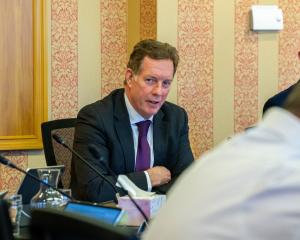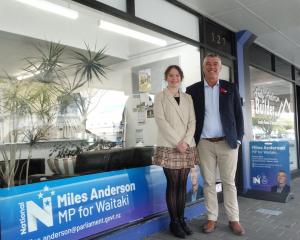The Electricity Commission and Transpower do not decide what and where new electricity generation should be built, energy sector consultant Jim Truesdale said yesterday.
That was a commercial decision made by the generation companies, which were putting their capital at stake in a competitive market, he said.
The Concept Consulting Group director was giving evidence at an Environment Canterbury hearing considering four resource consent applications from Meridian Energy Ltd for water for the north bank tunnel concept, a $900 million power scheme on the lower Waitaki River.
The hearing reconvened yesterday in Christchurch to hear further evidence, including the need for electricity in New Zealand and the place of hydro generation in filling that need.
That arose after a witness for Waitaki First, Oamaru consulting engineer Ken Mitchell, said during the hearing in Timaru last year there was no need for the tunnel scheme on the Waitaki River and there were better alternatives, contradicting evidence from Meridian's experts.
Mr Mitchell also questioned where the tunnel scheme fitted into long-term planning by Transpower and the Electricity Commission.
Yesterday, Mr Truesdale said Mr Mitchell appeared to misunderstand the New Zealand electricity system and market arrangements.
Generation companies, like Meridian, made their own assessments of investment opportunities subject to the electricity market.
The Electricity Commission had no direct role approving specific generation projects.
The commission developed a diverse range of alternative supply and demand scenarios so transmission development could be assessed.
"The inclusion of a possible generation project in any of the. . . scenarios cannot be construed as endorsement or otherwise of the project," Mr Truesdale said.
Mr Mitchell had said only the Electricity Commission had the authority to determine whether a project was the best solution from a national benefit perspective.
It had made no such assessment of the tunnel scheme.
"This is a broad and potentially misleading statement, intended or not, that the commission somehow approves generation developments," Mr Truesdale said.
The commission published a statement of opportunities to signal opportunities for upgrading Transpower's system under a range of scenarios.
The scenarios did not represent what the commission considered would happen, but were to enable grid development to be considered under a diverse range of possibilities.
Mr Truesdale said Transpower then produced annual planning reports, and the most recent was published in March.
The tunnel scheme was noted in that report.
It was not listed among the existing and committed schemes because it did not have resource consents, and Meridian had not made a commercial decision to build it.
Mr Truesdale said the tunnel scheme would increase energy storage because it was downstream of the Waitaki system's storage lakes.
Water from Lake Pukaki and Lake Tekapo would flow through an additional power scheme if the tunnel was built below the Waitaki dam.
Transpower's planning and development manager David Boyle emphasised the government body was a neutral observer. He said the Electricity Commission, among other things, approved transmission investments proposed in Transpower grid upgrade plans.
Both investigated possible sources of new electricity generation and then planned for its transmission. Mr Boyle said there appeared to be a degree of confusion over the inclusion or non-inclusion of the tunnel scheme in generation scenarios by Transpower and the commission.
Outlining some of those scenarios, Mr Boyle said the tunnel schemewas included in some, and not in others.
The first in 2005 did not refer specifically to the scheme, but the lower Waitaki.
In February this year, the commission outlined five scenarios.
Two included the tunnel scheme with a capacity of 280MW.
A draft report in July did not include the scheme because the commission's economic modelling found other power schemes cost less.
However, Meridian provided additional data which lowered the cost and the scheme may appear in some scenarios in the final report.
Transpower's annual planning report published in March had the tunnel scheme in three of five scenarios, with commissioning of the new scheme in 2015, 2017 or 2027, depending on the scenario, he said.










